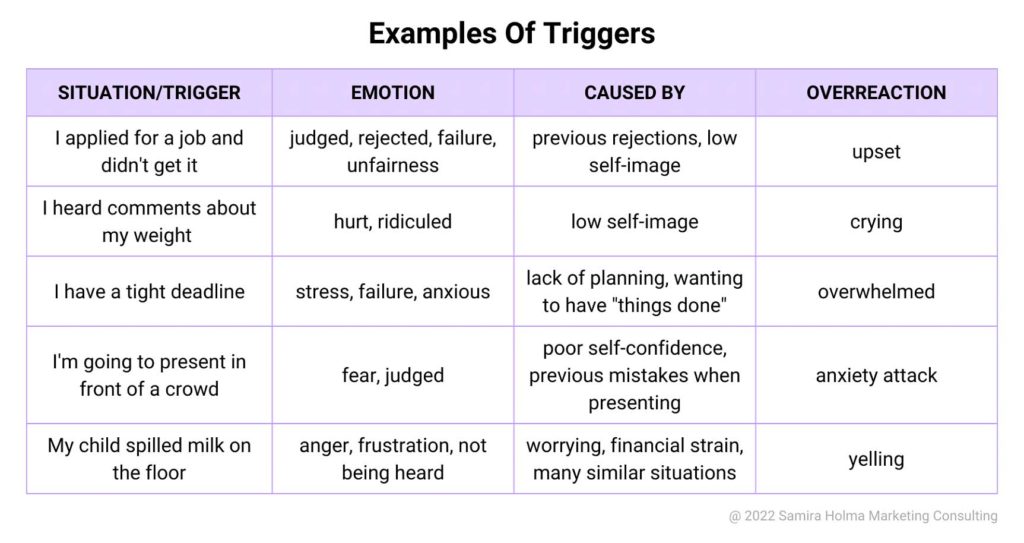The exploration of emotions within the framework of Bahá’í teachings offers profound insights into human behavior, particularly regarding emotional triggers. These triggers often elicit strong reactions, which can inhibit personal growth and create discord in relationships. Navigating the complexities of these triggers requires a multifaceted approach, one that aligns with the principles of unity, compassion, and personal responsibility inherent in Bahá’í doctrine. Below, a nuanced exploration is presented, detailing nine ways to address emotional triggers effectively while fostering a shift in perspective.
1. Cultivating Awareness
The first step in managing emotional triggers lies in cultivating self-awareness. Acknowledging one’s emotions without judgment is paramount. This Bahá’í principle of introspection provides the individual with an opportunity to identify specific triggers. Are they environmental stimuli, interpersonal interactions, or internal dialogues? By illuminating these triggers, one can begin the journey towards emotional regulation, opening paths to healthier responses.
2. Engaging in Reflection
Our emotional reactions often stem from past experiences. Engaging in reflective practices, such as journaling or meditation, allows individuals to delve deeper into their emotional landscapes. This aligns with the Bahá’í emphasis on the importance of reflection for personal development. Reflecting on the origins of these triggers can unveil patterns and narratives that explain current reactions. In this way, reflection acts as a catalyst for transformation.
3. Embracing Compassion
In moments of emotional upheaval, it is essential to embody compassion towards oneself and others. The Bahá’í teachings advocate for the recognition of the shared human experience. Acknowledging that everyone has their triggers encourages empathy. When faced with a hostile or emotionally charged interaction, responding with compassion can dissolve the tension and foster understanding. This shift transforms potential conflict into an opportunity for connection.
4. Developing Emotional Resilience
Building emotional resilience is critical in mitigating the impact of triggers. Bahá’ís are encouraged to cultivate virtues such as patience, understanding, and forgiveness. Resilience can be fortified through practices that enhance emotional regulation, such as mindfulness, yoga, or engaging in the arts. These practices not only strengthen one’s emotional foundation but also heighten awareness of the transient nature of feelings, promoting a healthier detachment from triggers.
5. Utilizing Affirmative Language
The words we choose wield immense power in shaping our perceptions and emotions. Adopting an affirmative language framework can alter the narrative we create in our minds about triggers. Biblically inspired guidance encourages the practice of speaking positively. This approach can assist individuals in reframing their responses to triggers, transforming initial negative interpretations into opportunities for personal evolution and growth.
6. Engaging in Dialogue
Open communication is foundational in addressing emotional triggers, particularly within interpersonal relationships. The Bahá’í teachings emphasize the significance of unity in diversity, which can be harnessed through candid dialogue. When discussing triggers with those close to us, articulating feelings rather than reacting impulsively fosters mutual understanding. This exchange can indeed mitigate resentment and facilitate healing.
7. Seeking Guidance
Turning to community resources or spiritual counselors for guidance in navigating emotional triggers is a practical step forward. In the Bahá’í community, consultation is valued as a means of collective problem-solving. Engaging with others who possess wisdom and experience can provide fresh perspectives. It is often through this communal approach that one may find innovative strategies to manage personal emotional responses.
8. Establishing Boundaries
One’s emotional wellbeing is paramount. Establishing healthy boundaries serves as a safeguard against recurrent emotional triggers. The Bahá’í principles support the notion of personal responsibility and self-care. Recognizing when to withdraw from unhealthy situations or relationships can preserve emotional integrity. This boundary-setting is not merely defensive but a proactive strategy to maintain harmony within oneself and with others.
9. Fostering a Growth Mindset
Finally, adopting a growth mindset in the face of emotional triggers transforms reactive experiences into opportunities for development. The Bahá’í teachings advocate for the progressive unfolding of one’s abilities and understanding. Viewing triggers as learning opportunities rather than impediments encourages adaptability. This re-framing nurtures a dynamic approach to personal challenges and promotes the realization of one’s potential.
In conclusion, navigating emotional triggers requires both introspective and outward-facing approaches rooted in the rich tapestry of Bahá’í teachings. Each of the aforementioned strategies emphasizes the importance of personal responsibility, community support, and the cultivation of virtues that enhance resilience and compassion. As one embarks on this journey, a profound shift in perspective towards emotional experiences can be anticipated, ultimately leading to a more harmonious existence and thriving interpersonal relationships. The interplay between personal growth and communal unity underscores the continuous journey towards emotional intelligence and well-being.
